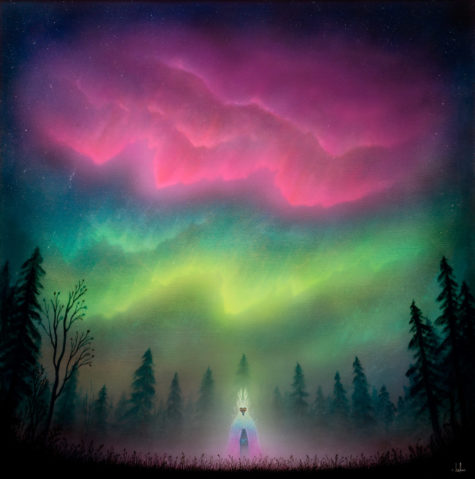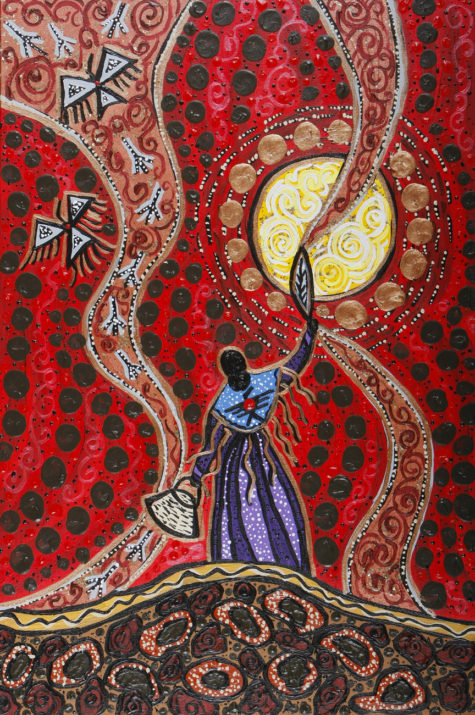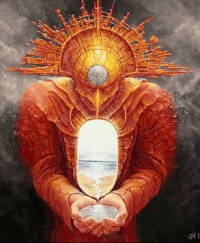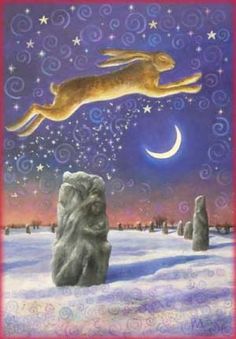Ojibwa
In their traditional system, Ojibwa children are guarded by a spiritual vision they acquire after their births. Their first names are taken from a vision or dream their mothers have during pregnancy, some event of spiritual significance that happens during their early lives or through a medicine person’s intercession with the spirits who seeks a vision and a name on their behalf.
But at adolescence, children are free to search on their own for a vision and a name to serve them through their adult lives. All boys are urged to quest for their names and girls are free to do so as well, though it is not required.
Children are separated from their people for a period of time and left alone upon the land, very often fasting, sometimes journeying, sometimes lying still, but all praying and waiting for a touch from spirit. They seek to learn what dogma cannot tell them, what not even the wisest one among their people can give them: an understanding of their innermost self and an awareness of the greater purpose for which they were born.
Girls may, if they choose, accept the vision of the Earth mother as Guardian Spirit and take their power from her through their capacity to bring forth life. The occasion of their first menstruation would then be an important rite of passage.
Both boys and girls who choose to seek their own visions are isolated from their people, consciously entering the world of the spirits with a willingness to release what they have believed about themselves in the past, while they fast and pray. At the end of three or four days, the elders or medicine people help to translate the visions.
Those who have returned from their fasts very often are named for the Guardian Spirit which revealed itself through their vision, some energy or spirit of nature that is believed to be each person’s personal access to strength and wisdom. The Ojibwa believe that every animal and plant has both a physical and a spiritual purpose in the Earthly ecology. The guardian is often closely associated with purpose, so those whose guardians are involved with healing might become aware of their own healing gifts through the contact.
The name and the vision are shared or kept secret, depending on the nature of the individual vision. But the acquisition of a name from the spirits is a cause for public celebration. Traditionally, this ritual made sure that all adolescents entered adulthood with some vision or purpose to which they were responsible. This was practical psychology, helping to ease the transition period for the young from the dependency of childhood to the responsibility of adult life.
Out of the context of its significance as a specific cultural drama, the ritual of the Vision Quest is a potent reflection of the rite of passage into spiritual maturity that can come at any physiological age.
When we were children, along with the protection and sustenance that we required, we allowed the world to create our contexts and our environments. We were given identities by our parents, our religions and our schools and we tried to match what we had been given. We were rarely encouraged to question or outgrow the visions that had been bequeathed to us, often being rewarded for accepting and staying within the structures, censored for our opposition.
But for many of us these visions just don’t work and we fall into confusion or despair. The moment we begin to grow is the one in which we question the identities we have been given and wonder who we are apart from our relationships with others and the work we do, and what our purpose is for being on the Earth at all.
The first impulse in seeking vision is thus an admission of ignorance. Whenever we release a definition of ourselves which served us for one period of our lives in search of a deeper, more powerful understanding, whenever we question the majority view or leave a group with which we have been an active part, we are beginning a Vision Quest.
With the release of the past and the willingness to leave the people behind and to go on alone, we lose both security and certainty. Fear, depression and confusion are all emotions evoked by the beginning of the quest, symbolized by going alone into the woods and into the night.
~From: A Voice From The Earth
True-Hearted Woman lived with her husband on an island in an archipelago populated by the Ojibwe. She loved her handsome young husband deeply and worked hard to provide for him. She even performed his tasks by night, to cover up his laziness and lack in providing equally well for her.
Now it happened that the husband of True-Hearted Woman fell in love with an Odawa woman he met on a visit to the mainland. His request to the elders of his village to take a second wife was denied, since they knew well enough who was fishing by night. But he did not release his desire.
In those days the women were excused from their daily work in camp and from caring for their children one week out of every month, if they were not with child. Women thus in their ‘moon’ traveled to a special woman’s camp on a nearby island. It happened that one month True-Hearted Woman believed she would be carrying a child. She spoke of it only to the Mashkikikwe, the Medicine Woman, who recommended that she go to Woman’s Island to take a rest from her wearying labors in the camp, until she knew for sure.
When the husband of True-Hearted Woman took her over to the woman’s island in a canoe, he realized that he had found the way to fulfill his hidden desire. After he let True-Hearted Woman go to the camp, he destroyed the small canoe left on the beach for her return at the end of the week, leaving her stranded on Woman’s Island all alone.
He returned to his own camp, tearing his clothes and blacking his eyes and telling a wild tale of evil spirits who had killed his wife. He told the people that he had only narrowly escaped with his own life. They believed the story and from then on they did not travel to Woman’s Island.
Who can know the thoughts of True-Hearted Woman as the weeks went by and she realized how deeply she had been betrayed. She faced a long terrible winter alone upon the island, with only her knowledge of the Midewiwin, the medicine society, her guardian spirits and her own young strength to comfort her and make her brave.
By the following spring, the husband of True-Hearted Woman had brought the Odawa woman that he had so desired back to his own camp to be his wife. But his ways soon belied his handsome face and words and she had no intention of working any harder than custom required. Before too long, she had left him for another man and he bemoaned his ill fortune.
He thought that if he brought an offering to the spirit of True-Hearted Woman, who could wish him no wll for what he had done to her, perhaps she might be appeased and his fortunes would change. So he traveled to the island with fear for the spirit which he now believed inhabited it.
He was shaking as he stepped on to the shore. When he saw a movement in the trees, he quickly let an arrow fly, but as he approached he found only True-Hearted Woman, dying from the arrow he had himself released.
Holding her in his arms as her spirit passed, he was filled for the first time with real remorse. Suddenly he heard the cry of a wounded animal coming out of the woods.
Following the sound he found the small lodge that True-Hearted Woman had built, within which she had survived the cruel winter. Inside the lodge he found an infant wrapped in skins – his son.
When he returned to his own island carrying the tiny boy, he admitted to his people all that he had done. He yielded to their judgment that he might be killed, only pleading with them to raise the child to be as brave as the mother, True-Hearted Woman. He wept real tears for the love of his son. The people felt pity for him and let him live. By all accounts he raised the boy well.
Woman’s Island was renamed True-Hearted Woman’s Island and all who visited there left a white stone upon the beach in honor of her bravery and her love. Even the white settlers who fised in those waters came to do the same and long afterwards the stones were used to build the first light-house for the islands. The name of True-Hearted Woman and the story of her bravery has never been forgotten.
~ A Voice From The Earth





